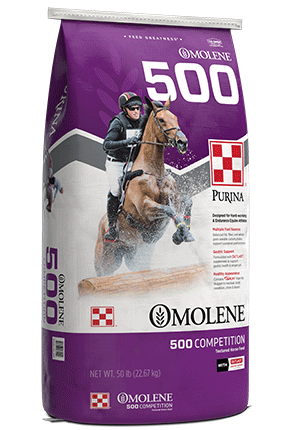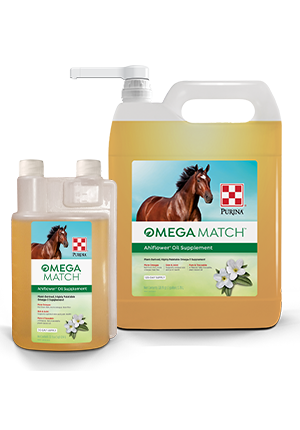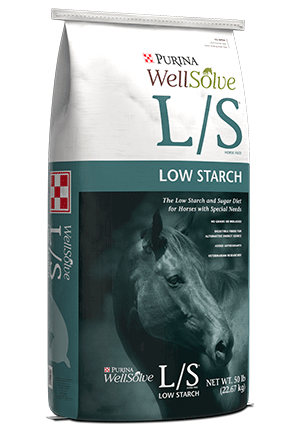
No Hoof, No Horse - How Nutrition Affects Hoof Growth
Nutrition : General Nutrition
Perhaps you’re familiar with the famous Benjamin Franklin quote, “For want of a nail the shoe was lost, for want of a shoe the horse was lost, and for want of a horse, the rider was lost, being overtaken and slain by the enemy — all for want of care about a horse-shoe nail.”
While Benjamin Franklin meant this quote as an example of how ignoring the little things can lead to failure in the bigger picture, most of us have taken this to illustrate the vital importance of healthy hooves to the soundness and performance of the horse. Hoof quality is affected by several factors including genetics, environment and nutrition. Some horses inherit weak hooves, and that can’t be changed. But proper care and nutrition can help a horse develop and maintain the best hooves genetically possible. On the other hand, a horse may have the genes for great hooves, but improper care and inadequate nutrition can lead to hoof problems for that horse.
Proteins are made up of different amino acids, and the amino acid concentration within the horn of good-quality hooves has been shown to be different from that of poor-quality hooves. However, a study from Geyer and Schulze in 1994 failed to show an effect of specific amino acid supplementation on the growth of hooves. While the essential amino acid methionine is thought to be important for hoof quality, if fed in excess it is thought to cause a depletion of iron, copper and zinc, which may be associated with crumbling horn and white line disease. Fats are needed by the hoof to create a permeability barrier that assists in cell-to-cell adhesion, helping prevent bacteria and fungi from penetrating the horn. Diets containing adequate levels of fat can, therefore, be beneficial to the hoof.
Calcium and phosphorus, and the ratio of one to the other, also has an impact on hoof development. Calcium is needed for cell-to-cell attachment in the hoof horn. Calcium is also important in the metabolism of the intercellular lipids. Excess phosphorus can block the absorption of calcium from the small intestine, which ultimately can cause weak and abnormal bones and affect cell-to-cell attachment.
Selenium is important as an antioxidant for the protection of cellular membranes. However, excess selenium in the diet can lead to substitution of sulfur in the keratin fibers with selenium, resulting in poor structural integrity. Chronic selenium toxicity can result in hair loss, coronitis and bleeding of the coronary band as well as sloughing of the hoof and even laminitis.
With horses that have poor hoof quality despite good environment and balanced nutrition, there may be some benefit from a therapeutic dose of biotin supplementation. But for the majority of horses, a diet with naturally occurring biotin, a good amino acid and fatty acid balance, and proper vitamin and mineral fortification will support excellent hoof growth rates and quality of growth.
There are several nutrients that can exert a direct influence on the growth rate and integrity of the hoof. It is the balance of these nutrients with each other that is most important in the growth of a normal hoof.
While Benjamin Franklin meant this quote as an example of how ignoring the little things can lead to failure in the bigger picture, most of us have taken this to illustrate the vital importance of healthy hooves to the soundness and performance of the horse. Hoof quality is affected by several factors including genetics, environment and nutrition. Some horses inherit weak hooves, and that can’t be changed. But proper care and nutrition can help a horse develop and maintain the best hooves genetically possible. On the other hand, a horse may have the genes for great hooves, but improper care and inadequate nutrition can lead to hoof problems for that horse.
Do nutrients affect hoof growth and quality?
There are several nutrients that can influence hoof growth and quality, but there is very little evidence to suggest that the addition of extra nutrients to an already-balanced diet will promote hoof growth in the normal horse. However, energy or calorie content of the diet can have an impact on hoof growth. Research has shown that feeding young, growing horses a lower-calorie diet that led to reduced weight gain also resulted in slower hoof growth. Protein deficiency can have the same effect as energy deficiency since hoof structure is primarily keratin, a protein. The hoof growth of weanlings fed 10 percent protein was only two thirds that of weanlings fed 14.5 percent protein (Comben, Clark and Sutherland, 1984).Proteins are made up of different amino acids, and the amino acid concentration within the horn of good-quality hooves has been shown to be different from that of poor-quality hooves. However, a study from Geyer and Schulze in 1994 failed to show an effect of specific amino acid supplementation on the growth of hooves. While the essential amino acid methionine is thought to be important for hoof quality, if fed in excess it is thought to cause a depletion of iron, copper and zinc, which may be associated with crumbling horn and white line disease. Fats are needed by the hoof to create a permeability barrier that assists in cell-to-cell adhesion, helping prevent bacteria and fungi from penetrating the horn. Diets containing adequate levels of fat can, therefore, be beneficial to the hoof.
Mineral balance influences hoof growth and quality
A proper balance of minerals is also important to hoof growth and quality. For example, a study by Harrington, Walsh and White in 1973 showed zinc to be important in the normal keratinization of the hoof. Horses with insufficient hoof horn strength had less zinc in the hoof horn and plasma than did horses with no hoof horn damage.Calcium and phosphorus, and the ratio of one to the other, also has an impact on hoof development. Calcium is needed for cell-to-cell attachment in the hoof horn. Calcium is also important in the metabolism of the intercellular lipids. Excess phosphorus can block the absorption of calcium from the small intestine, which ultimately can cause weak and abnormal bones and affect cell-to-cell attachment.
Selenium is important as an antioxidant for the protection of cellular membranes. However, excess selenium in the diet can lead to substitution of sulfur in the keratin fibers with selenium, resulting in poor structural integrity. Chronic selenium toxicity can result in hair loss, coronitis and bleeding of the coronary band as well as sloughing of the hoof and even laminitis.
The effect of biotin on hoof growth
The most-investigated vitamin related to hoof growth is biotin, a water-soluble vitamin that is manufactured by microbes in the digestive system. Controlled studies have reported varying results on the effect of biotin supplementation on hoof growth and quality. Some studies, such as one conducted by Schryver and Hintz in 1983, found biotin supplementation to help some horses grow better hooves, other studies found no advantage, and one study reported a reduced growth rate with biotin supplementation. The level of supplementation was 10 to 30 mg. of biotin per day over a nine- to 38-month period, and improvement was observed in some but not all of the horses.With horses that have poor hoof quality despite good environment and balanced nutrition, there may be some benefit from a therapeutic dose of biotin supplementation. But for the majority of horses, a diet with naturally occurring biotin, a good amino acid and fatty acid balance, and proper vitamin and mineral fortification will support excellent hoof growth rates and quality of growth.
There are several nutrients that can exert a direct influence on the growth rate and integrity of the hoof. It is the balance of these nutrients with each other that is most important in the growth of a normal hoof.





